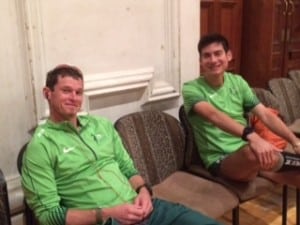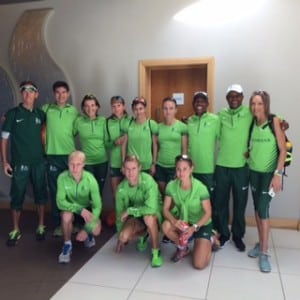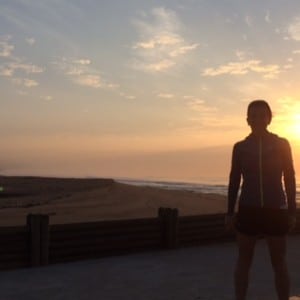I remember the day well, the 18th of March, 2015. It was a Wednesday. I’d been dealing with some niggling injuries over the previous month or so but with some rest and guidance from my physio I was just beginning to feel that I was making headway and a return to 100% training. I’d seen my physio earlier that day, run a very sweet pain-free 25 kilometers, and needed to head into the city to see my massage therapist. I’d almost gone to see him a few days earlier but had not been able to make that appointment. Having already cycled that day I was tempted to jump on the bus, but I figured that I really shouldn’t be lazy and so I got on my bike for my regular 13k commute to his clinic. I was so close to getting to my massage appointment and then suddenly–bam! A car cut into my lane and I slammed on my brakes, went flying over the handlebars, and with an abrupt thud, I landed on the tarmac, narrowly missing hitting the car. It all happened in a flash and within an hour I learned that I had a badly broken hand that was in need of surgery. My dreams of running the 2015 Comrades Marathon seemed to be disappearing equally as fast as the accident took place. For anyone who knows me this was devastating. I love the Comrades with a passion and couldn’t bear the thought of possibly missing the race.
For the first few days there was no way I was in any state to run. My hand was painful and in a huge, heavy cast whilst I waited for surgery. And then there was the surgery, with the accompanying heavy dose of drugs. So for a few days I certainly had no energy or desire to run either. However, within a few days I was getting itchy feet to get back running. After all with each and every day I lay on the couch unable to run or even cross train, it was another day that I was losing fitness whilst my Comrades competitors honed theirs. There were weekly follow-up visits with my surgeon and for too many of those visits, the news was “Still no running. Wait a little longer.” After three very long weeks, I practically ran straight out of the hospital when my surgeon gave me the green light to run. Training was back on!
Seven weeks. Was seven weeks long enough to train for Comrades? Somehow I doubted it. After all, those seven weeks would include my taper so in reality I maybe had 4.5 weeks to train for one of the most competitive ultras in the world, and my favourite event of the year. This hardly seemed ideal. But that weekend I went out for a 33k run, something that would normally be a routine jog, and whilst my pace wasn’t that slow my legs felt pretty much as beaten up as they had after my first-ever marathon. It wasn’t exactly encouraging. But if one thing was sure, I wasn’t going to give up quite yet.
And so on I ploughed through my express training plan, with the okay from my physio that in theory I should be able to handle this rather rapid increase in training load. One 40k long run the next weekend to top off a 190k week and 50k long runs the following three weekends; thankfully after each of these runs my legs felt a little better despite more miles, more hills, and a little more speed. My weekly speed workouts were surprisingly good, maybe those three weeks of lying on the couch had in fact rejuvenated my usually overworked legs. Even so, I surprised myself with a 2:47 at the Vancouver Marathon (as part of one of my 50k long runs) four weeks ahead of Comrades. It was as a friend cheered me in the final kilometer of that race that I shouted out to him, “I’m going to Africa!” I booked my flights the next day.
As I landed in Durban some five days ahead of Comrades I wasn’t naïve enough to believe that I could defend my title. 2015 was an ‘up’ year at Comrades and I knew that the previous year’s ‘down’ route suited my running strengths much better. It would have likely been a tough goal to have won the up run even had training gone perfectly, but it would have been a goal that I would have readily embraced. However now I was faced with the prospect of going to a race where I felt my training was at best minimal and that the course direction did not suit my strengths. Yet somehow many other people thought I could still win.

Americans Max King (left) and Sage Canaday at Comrades. All photos courtesy of Ellie Greenwood unless noted otherwise.
Of course by race day a few, old, niggling pains were resurfacing that were adding to my doubts about what on earth the outcome of race day would be. When I lined up at the start line in Durban last Sunday at 5:30 a.m., I was beginning to doubt if I’d even be able to make it to the finish line, some 88k away in Pietermaritzburg. Normally when I have these race-day doubts, I have the reassurance of thinking back on the months of dedicated training that I’ve put in in order to be in top shape for race day, but this was not the case this time around. Instead I felt that many others were far better prepared than I was. I should probably take this chance to publicly apologise to my teammate Max King, who had to listen to me constantly verbalise my many self-doubts when he too was preparing to race the next day. Sorry Max!
Why was I at the start line anyway? Why fly halfway around the world to a highly competitive race as the defending champion when in my heart of hearts I was pretty sure that I couldn’t win? Why? Because it was Comrades. The Ultimate Human Race. The event that I love with a passion, the event steeped in history and tradition, the event where I feel so welcome and at home surrounded by friends from across the world. This was my fourth running of Comrades and it is an event that celebrates multiple finishers and I was so determined, if nothing else, to achieve my fourth finisher’s medal and soak up the amazing atmosphere of race day.

Ellie and the Nedbank team.
The day lived totally up to its hype. It was the typical Comrades start–jam packed into the starting pen, quite literally crammed next to my teammates Joasia Zakrzewski (Great Britain) and Sophia Sundberg (Sweden), the rousing singing of the South African national anthem, the sounds of Chariots of Fire, the wonderful sounds of Shosholoza, and then the cock crow, a gun blast, and boom! Some 20,000 runners surged forward at a pace suggesting that Pietermaritzburg was 8.8k away, not the 88k away it truly was. Here goes nothing, I thought. Let’s see if I can do this.
The amazing thing was that it was one of those days when the 88k’s sped by. Whilst I’m not going to deny there weren’t times when I was counting down the kilometres one by one, there was so much to distract any runner that it seemed like much of the time the race was zipping by, despite my struggles. My hips were very tight and my legs a little heavy but I kept moving and ploughing forward, one landmark to the next, one uphill to the next downhill, one struggling flat to the next aid station. And the most wonderful thing was to feel truly at home in Africa–folks from Salomon South Africa who I’d met just days earlier cheered from the sidelines, I spent much of the run accompanied by other ladies on the Nedbank team, and once in a while I’d hear a British voice cheer me by name from the crowds. Yes, my Vancouver Falcons teammates weren’t there, unlike at the Vancouver Marathon a few weeks earlier, but other than that there was so much support to keep me moving ahead, even if the pace was not exactly stellar.

Ellie (left) and the team going strong. Photo: Carel Bosman
My lack of fitness was soon evident. I struggled to keep up with Charne Bosman, Nina Podnebesnova, and Emmerentia Rautenbach (all ladies also running for Nedbank) on the uphills, but I somewhat caught up and kept pace for a good while on the downhills and flats. It was a welcome surprise to be able to share some words and early miles with my friend and teammate Charne (South Africa) before she pulled ahead, and I so welcomed the encouragement from Nina as I walked a hill, even though I didn’t understand an actual word of her Russian! But it was not just my lack of fitness that was a struggle, what was also a struggle was to try maintain a competitive mindset when I’d already talked myself out of doing really well in the race. I found I was somewhat content to let ladies pull a little ahead of me and so it was much needed to have Patrick Baransky (Nedbank manager) at several points along the course giving feedback of my time and position as this would pull me back into racing, rather than just running. Even so, I was tending to think more about being caught from ladies behind me, rather than focusing on the women ahead. At Comrades coming in the top 10 is a big deal, and I had only decided to race Comrades when I thought top 10 was feasible. To be sitting in seventh position was somewhat reassuring, until I would think of the talented ladies behind me who could easily catch me. I knew that I had to keep moving, I had to keep run/walking those uphills to ensure that I maintained my current position. It was not until I was up and over the final uphill of Polly Shortts that I would breathe a sigh of relief, not only had I not gotten caught but that I was also gaining on Emmerentia and sixth place could be mine. It was with one final push to end the race that I took that extra position before leaping, Jorge Maravilla style, over the finish line.

Ellie and Charne Bosman, who finished second, sharing some tarmac. Photo: Carel Bosman
My initial reaction was of pure happiness to have run the Comrades once more, and to have earned another coveted gold medal for finishing in the top 10. At the start line I had handed my passport to one of the crew, Tania, as top 10 would need their ID for doping control at the finish line, and I was just delighted that I needed to now go find Tania to get that passport back. Yes doping control is not exactly fun but it shows you have placed well!

Another sun sets on Ellie at Comrades.
In the hours and days post race I have already started to pick my race apart and feel I could have done much better. Whilst Caroline Wöstmann won in a stunning time that I would have had no hope of attaining, positions two to five seem somehow possibly within reach now as I analyse my race again and again in my head.Hindsight in a great thing–could I have pushed the hills harder, stopped less to grab drinks, or just got into a more competitive mindset and run that little bit faster to gain a few valuable minutes and thus positions? Who knows and the fact is I didn’t run that little bit harder and that little bit faster. I ran the race I ran and I’m happy enough with that, because although my own performance was not exactly a good race, a day on the Comrades course is never anything short of a great race. I’ll be back in 2016 to hammer those downhills and, broken fingers crossed, suffer no training interruptions.
Finally, three shout outs to the people who kept me ploughing along on Comrades day. To my Nedbank teammate Riana van Neikerk who was diagnosed with cancer just a few days before Comrades–she was with all of us in spirit if not in person. To Dave Mackey–when the going got tough I tried to be Mackey tough. I likely failed but here’s hoping to a full and successful recovery, Dave. And to my Vancouver Falcons teammates, for being the best training partners anyone can ask for.
